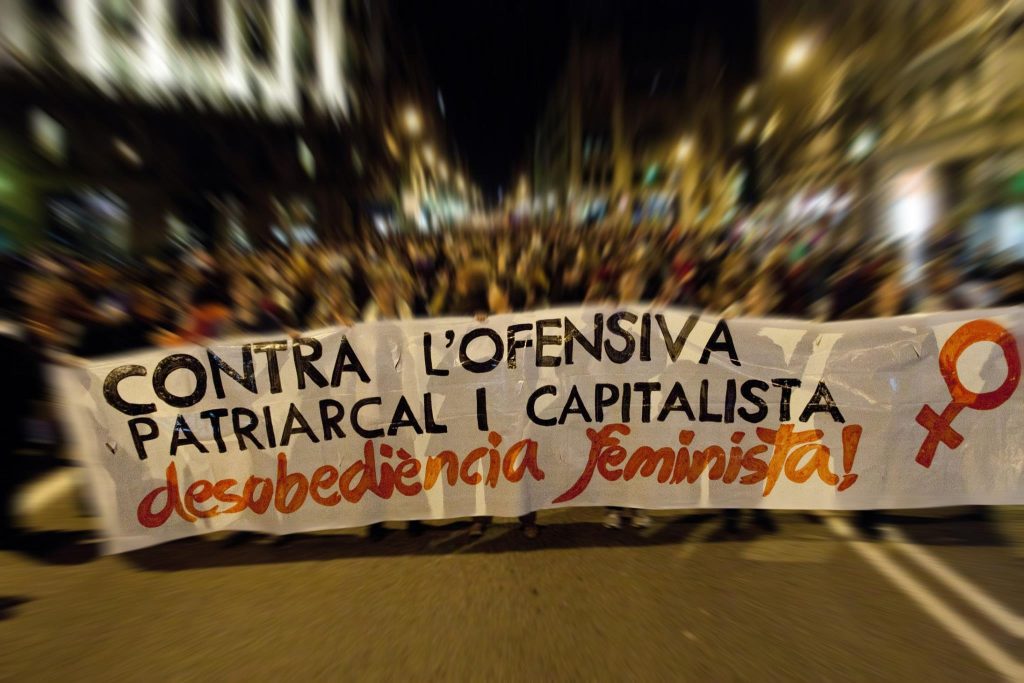Democracy and feminist politics: a crucial relationship

Democracy is a constant, contested, and unfinished process of democratization. Rights and freedoms are not achieved or lost once and for all, but rather the object of ongoing struggles. Some social and political forces support democratization, while others oppose democratization, therefore contributing to democratic backsliding. Democratization and democratic backsliding are gendered processes. Our last CCINDLE blog talked about how the process of transition to democracy in Poland paved the way to current democratic backsliding by limiting the right to abortion. In this blog we point at the importance of feminist politics in the struggle for democratization and illustrates this through the case of feminist local politics in Barcelona.
Feminist politics is one of the key forces that struggle for democratization. As a political project, it aims at transforming unequal gender and intersectional power hierarchies through ‘a vision of ‘an alternative’ and actions to redress injustice. Feminist politics democratizes the state by questioning gender and intersectional inequalities in areas such as economy, gender-based violence, care, sexual and reproductive health, political representation, intimate citizenship rights, and knowledge.
Feminist politics also democratizes the state by claiming new rights for formerly excluded subjects and issues, as is the case with activists’ demand of public policies to address gender-based violence, reproductive justice, or LGBTQI* rights. In addition, feminist politics democratizes the public sphere by promoting inclusionary and participatory processes. Intersectional inclusion of marginalized groups’ claims in policymaking counteracts privileges and exclusions that tend to be structured around gender intersecting with class, race, ethnicity, sexuality, age, citizenship status, and other inequalities. Participation ‘in the making of decisions’ empowers citizens in the everyday practice of democracy.
Therefore, feminist politics is a democratizing force in that it experiments with future projects of society based on the centrality of the common good, political solidarity, care for the people and the planet, and intersectionality of gender, race, class and other inequalities. As a result, feminist politics performs a critical function for democracy by scrutinizing power and holding the state accountable for gender equality commitments.
If feminist politics is a necessary ingredient for democratization, it needs democracy for performing these vital functions. Democracy and gender equality have an interdependent relationship, as Mieke Verloo claims: ‘The more democracy, the more chances for gender equality; the more gender equality there is, the more chances for democracy’.
Multiple evidence of this interdependent relationship between democracy and gender equality exists. Democracies show progress in women’s status concerning health, education, economic participation, and political empowerment. Since democracies allow more freedom of organization and expression to civil society than autocracies, they offer greater opportunities for feminist, LGBTIQ*, antiracist, and Human Rights groups to influence the state. Citizens in democracies also tend to express more egalitarian public opinions. A quality democracy is therefore needed for feminist politics to work towards deepening gender equality rights, democratizing societies even further. In this blog we address how feminist politics works as a democratization force by focusing on a Spanish case of feminist institutional politics at the local level.
Feminist institutional politics and democracy: the case of Barcelona
We argue that the feminist politics of Barcelona’s local government since 2015 illustrates the relationship of feminism and democracy. Barcelona has been a laboratory of feminist municipal politics after the institutional change that followed the 2011 civil society mobilizations. It has embraced municipalism, a democratizing project of community participation and redistribution promoted by civic platforms. Barcelona’s policies in the last decade have promoted gender equality goals, and have sought to transform institutional processes and engage civil society in the governance of the city.
Barcelona’s gender equality policies promote a more equitable social distribution of care and time, involving the co-responsibility of public administrations, companies, and society. They foster the reduction of intersectional-gender inequalities in the use of public space and transport (e.g., more accessible, and friendly sidewalks, and public transport sensitive to women’s mobility patterns). These policies combat the structural factors that determine the feminization of poverty and precarity, showing an emerging emphasis on intersectional equality. The city has also elaborated policy instruments to implement a gender perspective in public expenditure, municipal plans and legislation, such as yearly gender impact budget reports, or gender equality clauses for public contracts.
Feminist institutional politics in Barcelona have tried to transform municipal institutions by strengthening the gender equality machinery and the mainstreaming of gender across all areas of the local government, while reinforcing the collaboration channels with the civil society. This includes gender training for political and technical personnel and the involvement of different institutional departments in the elaboration and implementation of Gender Justice Plans. Framed as a core dimension of democratic revitalization, Barcelona’s principle of co-production calls for the involvement of civil society in policymaking, especially feminist and women’s organizations as first-hand connoisseurs of society’s needs and priorities. The participation of feminist and women’s organizations in policymaking processes has experienced a substantial increase: from 3% in 2017 to 69.2% in 2021. This contributes to policymaking based on feminist knowledge and experience.
In sum, feminist politics and democracy are crucially interrelated. Feminist processes of democratization are challenging, and so is putting feminist institutional policies into practice. Barcelona City Council, while still perfectible, illustrates an understanding of democratic and feminist institutional politics, where gender-intersectional inclusion and participation represent core aspects of the democratization process.
By Emanuela Lombardo, Paloma Caravantes and Silvia Díaz-Fernández
Blogpost originally published in CCINDLE project website
Photo by Barbara Boyero Rabasco